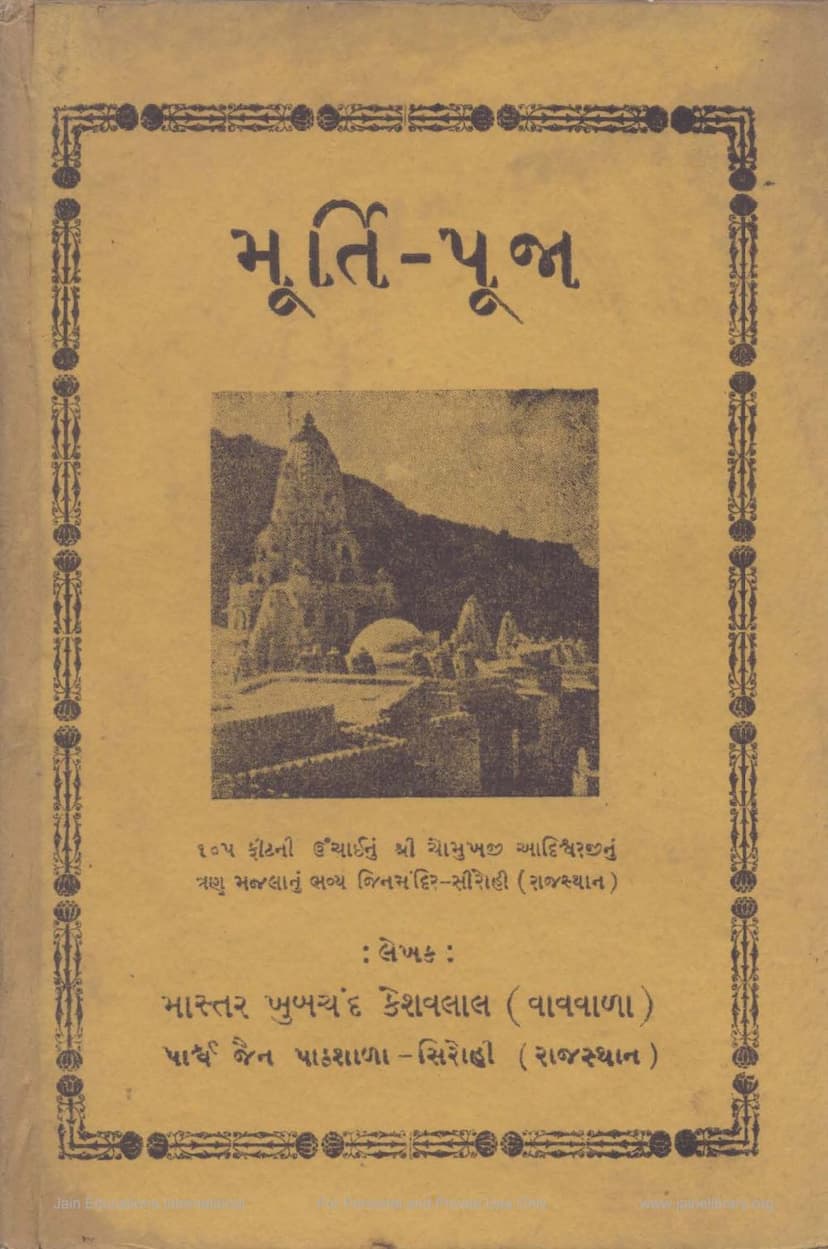Murtipooja
Added to library: September 2, 2025
Loading image...

Summary
The book "Murtipooja" by Khubchand Keshavlal Master, published by Gyan Pracharak Mandal Sirohi, is a comprehensive defense and explanation of idol worship within Jainism. The book aims to clarify the significance, antiquity, and validity of idol worship, addressing criticisms and misunderstandings.
Key themes and arguments presented in the book:
- Idol Worship as a Means to Spiritual Attainment: The book posits that the worship of idols of Vitarag (Tirthankaras) is a primary means for individuals, especially in the current era, to connect with the divine and progress spiritually. It emphasizes that even great yogis like Anandghanji Maharaj valued both material and spiritual aspects of idol worship.
- Ancient and Universal Practice: The author asserts that idol worship has been a universal practice throughout history and will continue to be so. The book argues that various religions and cultures, directly or indirectly, engage in some form of idol worship.
- Rebuttal to Criticisms: A significant portion of the book is dedicated to refuting the arguments made by critics, particularly a series of articles by Dr. N.K. Gandhi published in the "Jain Siddhant" monthly magazine. Dr. Gandhi's criticisms are presented as attacks on Jain Tirthankaras, ancient Acharyas, and the core principles of the Shvetambar Jain community.
- The Concept of Nikhshepa (Categories): The book delves into the Jain philosophical concept of Nikhshepa (Name, Establishment, Substance, and Form) as a framework to understand and justify idol worship. It explains how each of these categories relates to the divine and how, through the concept of 'Establishment' (Sthapana), an idol becomes a valid representation for worship.
- Historical Evidence and Scholarly Support: The author draws upon historical accounts, ancient Jain scriptures (Agamas), and the writings of renowned Jain scholars and Acharyas to establish the antiquity and authenticity of idol worship. The book cites examples of historical figures and events that support the practice.
- The Role of Idols in Spiritual Focus: The book argues that idols serve as a focal point for devotion, helping to concentrate the mind and cultivate spiritual feelings. It draws parallels with other practices in life and other religions where visual representations are used for remembrance and inspiration.
- Addressing the Concept of Violence in Idol Worship: The author addresses the criticism that idol worship involves violence (himsa). The book clarifies the Jain understanding of himsa, categorizing it into three types: Anubandh Himsa, Hetu Himsa, and Swaroop Himsa. It argues that the essential violence in Jainism relates to intention and consequence rather than mere physical actions involved in preparing for worship.
- The Importance of Intention (Bhava): The book stresses that the effectiveness and spiritual merit of idol worship lie in the devotee's intention (bhava) and faith, rather than the physical substance of the idol itself.
- Historical Context of Opposition: The book traces the historical roots of opposition to idol worship within the Jain community, attributing it to figures like Lauka Shah in the 16th century, and discusses the subsequent emergence of different sects based on these differences.
- The Union of Different Sects: The book notes a trend where individuals from sects initially opposing idol worship have, over time, embraced the practice, indicating a convergence towards this aspect of Jainism.
- Social and Economic Impact of Temples and Idols: The author highlights the positive social and economic contributions of temples and idol worship, such as providing employment, fostering community development, and encouraging charity.
- The Importance of Faith and Belief: The book ultimately emphasizes that while scholarly arguments and historical evidence are presented, the core of idol worship lies in faith and devotion. The author encourages readers to approach the subject with an open mind and an earnest desire for spiritual truth.
In essence, "Murtipooja" is a scholarly and devotional work that meticulously builds a case for the integral role of idol worship in Jain practice, emphasizing its scriptural basis, historical continuity, and spiritual efficacy. It aims to strengthen the faith of believers and provide a reasoned defense against those who question or oppose the practice.